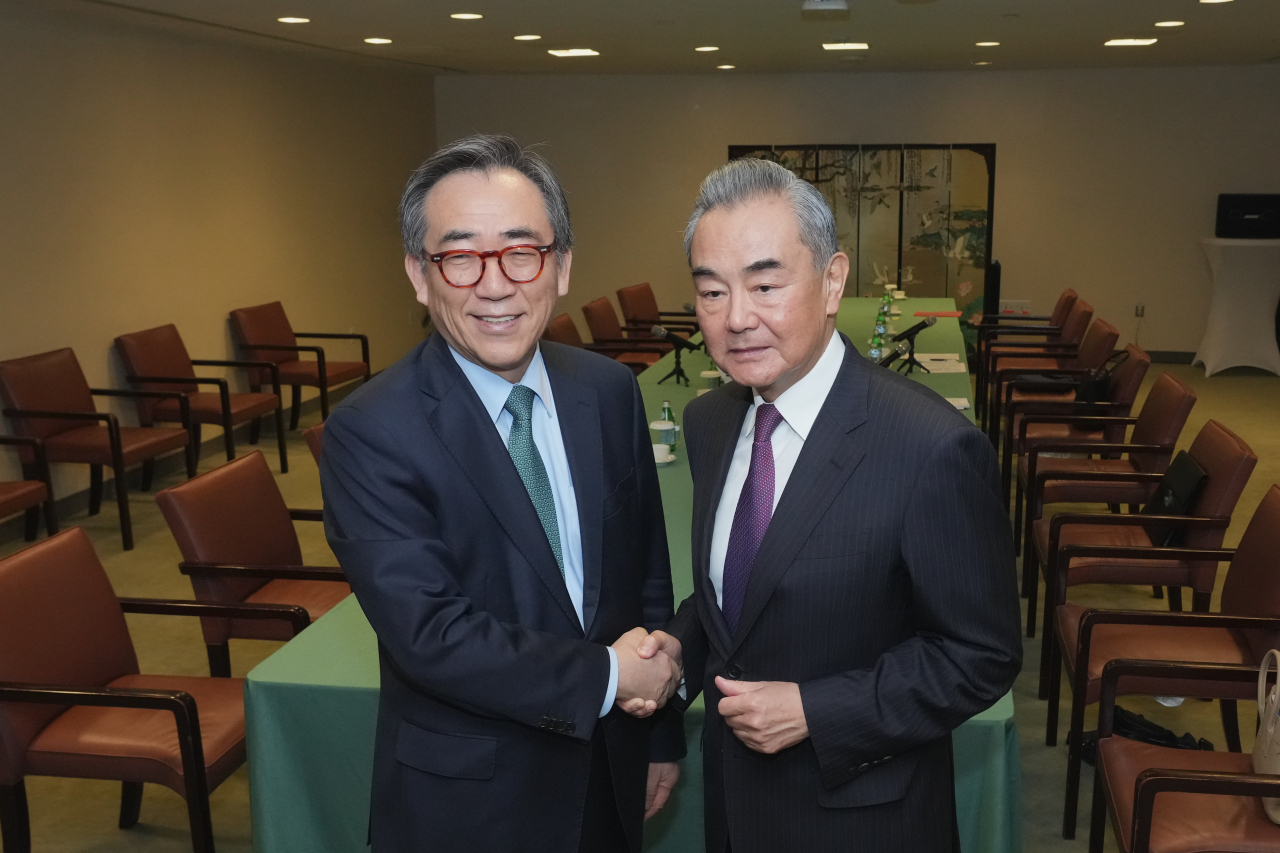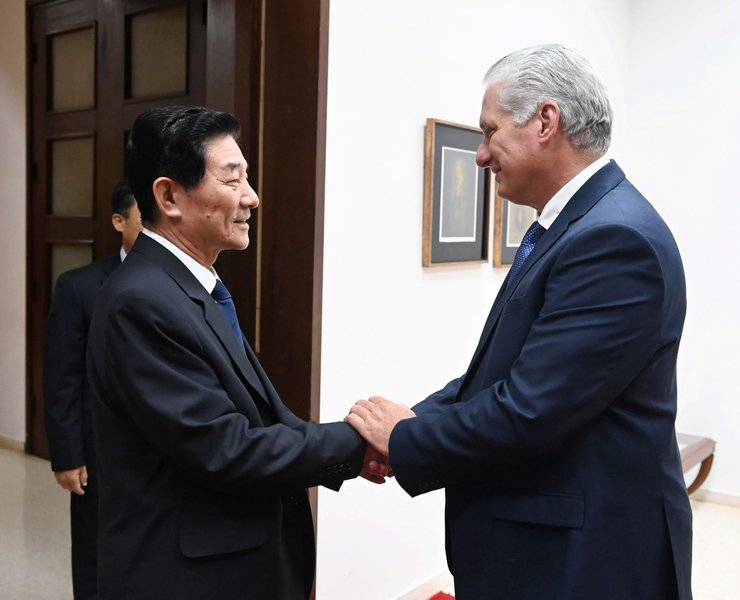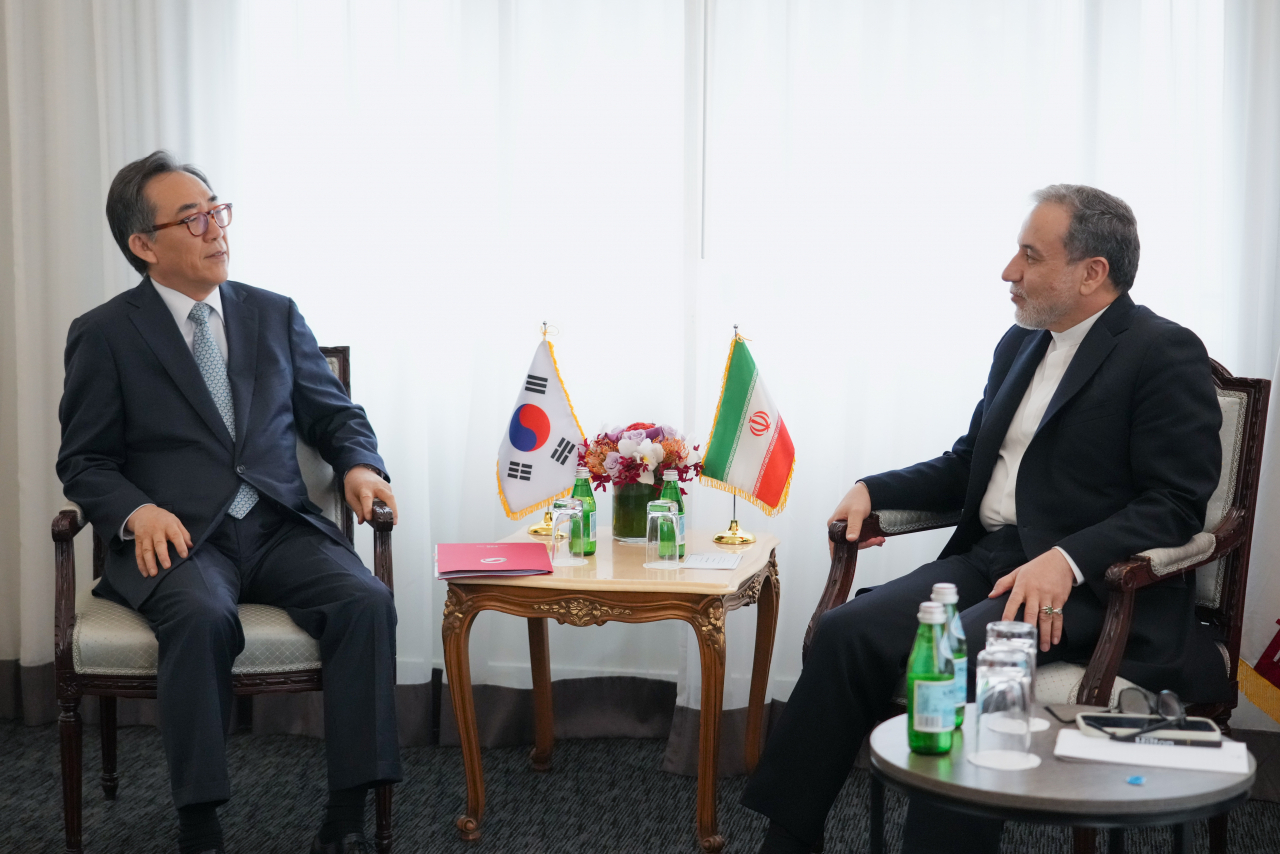 |
South Korean Foreign Minister Cho Tae-yul and Chinese Foreign Minister Wang Yi shake hands during their 45-minute meeting on Saturday, held on the sidelines of the UN General Assembly in New York. ( (South Korea's Ministry of Foreign Affairs) |
South Korea ramped up its diplomatic efforts to gain greater influence over North Korea’s traditional allies and old friends -- China, Cuba, and Iran -- with Foreign Minister Cho Tae-yul spearheading a series of high-level talks on the sidelines of the United Nations General Assembly in New York.
Central to the efforts was Cho's third face-to-face meeting of the year with Chinese Foreign Minister Wang Yi on Saturday, a meeting South Korea's Foreign Ministry described as part of "close strategic communication."
The dialogue, showcasing strengthened bilateral cooperation and exchanges, paved the way for a significant development: The two ministers agreed to pursue a summit between President Yoon Suk Yeol and Chinese President Xi Jinping during the upcoming Asia-Pacific Economic Cooperation summit in Peru this November, the Seoul ministry said.
Beyond diplomatic coordination, the two ministers also agreed to bolster cooperation across sectors -- enhancing exchanges between local governments, parliaments, academia, and citizens -- while strengthening economic collaboration to foster growth and improve livelihoods in both nations, the ministry added.
Wang noted the growing bilateral exchanges and cooperation this year, stating that the "bilateral relationship has shown a positive trend of improvement, demonstrating that the efforts of both sides are in the right direction with promising results," according to the Chinese Foreign Ministry.
Building on the momentum of deepening ties, South Korea's First Vice Foreign Minister Kim Hong-kyun joined a high-profile reception on Thursday, which drew over 800 guests in celebration of the 75th anniversary of China’s founding on Oct. 1.
In Pyongyang, Kang Yun-sok, vice chairman of North Korea's standing committee of the Supreme People's Assembly, joined a similar reception hosted by Chinese Ambassador Wang Yajun on Friday, continuing the tradition of North Korean officials of Kang’s rank attending the annual Chinese National Day event.
 |
Cuban President Miguel Diaz-Canel meets with North Korea's newly appointed ambassador, Han Su-chol, for their first official meeting on Friday in Havana. (Presidential Office of Cuba) |
The two Koreas also vied for clout over Cuba.
In Havana, Cuban President Miguel Diaz-Canel held his first meeting with North Korea's newly appointed ambassador, Han Su-chol, on Friday, with Cuba's presidential office emphasizing the enduring friendship between the two countries in a press release.
Han delivered a personal message from North Korean leader Kim Jong-un, who expressed his "close attention to the development of historic relations with Cuba," while describing their ties as a "source of pride and a precious legacy." Diaz-Canel echoed this sentiment, highlighting the upcoming 65th anniversary of diplomatic relations in 2025 and called for joint celebrations to mark the occasion.
While Kim's remarks might be viewed as standard diplomatic rhetoric, they hold significance against the backdrop of increasing interactions between South Korean and Cuban officials following the establishment of diplomatic ties in February.
Cho held a meeting with Cuba's Foreign Minister Bruno Rodriguez Parrilla on Sept. 24, on the sidelines of the UNGA -- the first since Cuba and Seoul established diplomatic relations.
The two ministers explored multiple avenues of cooperation, including the establishment of resident embassies and collaboration in areas such as development cooperation, culture, sports, and people-to-people exchanges, according to South Korea's Foreign Ministry. The ministry added, "Both countries are working together to establish resident embassies as soon as possible."
 |
South Korean Foreign Minister Cho Tae-yul meets with his Iranian counterpart Seyed Abbas Araghchi on September 26 on the sidelines of the UN General Assembly in New York. (South Korea's Ministry of Foreign Affairs) |
Cho also met with Iranian Foreign Minister Seyed Abbas Araghchi on Sept. 26 on the margin of the UNGA --their first meeting since Araghchi took office in August.
The two ministers acknowledged over 60 years of friendly cooperation between their nations and expressed a commitment to "make joint efforts in multiple areas to further advance relations," particularly now that the issue of Iran’s frozen funds in South Korea has been resolved, according to the Foreign Ministry in Seoul.
Cho expressed "strong expectations" for Iran's new government, which he believes has placed a significant emphasis on dialogue and engagement.
"Minister Cho conveyed his hope that Iran, through improved relations with the international community, will create a more favorable environment for expanding cooperation between Korea and Iran," according to the South Korean ministry.